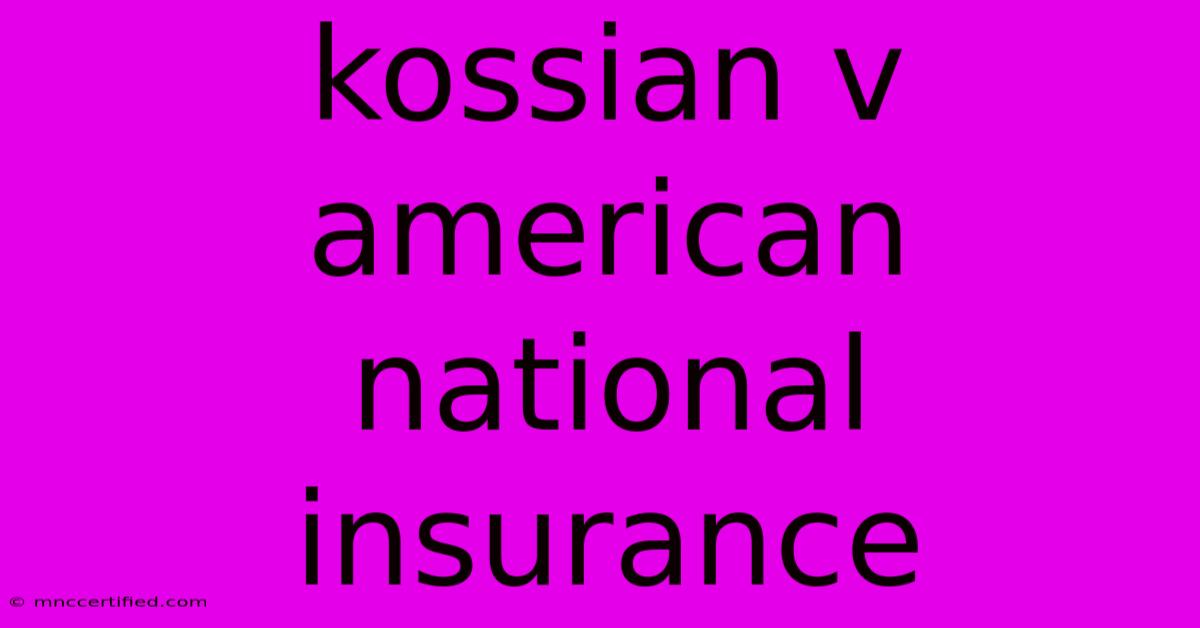Kossian V American National Insurance

Table of Contents
The Kossian v. American National Insurance Case: A Landmark Ruling on Disability Insurance
The case of Kossian v. American National Insurance stands as a landmark ruling in the realm of disability insurance law. This case, decided in 2008, significantly impacted how courts interpret disability insurance policies and the standards used to determine eligibility. Understanding the details of this case and its implications can be crucial for anyone seeking disability benefits or navigating the complex world of insurance claims.
The Facts of the Case: A Fight for Disability Benefits
The case involved John Kossian, a former accountant who was diagnosed with fibromyalgia and chronic fatigue syndrome. After becoming unable to work due to his conditions, Kossian filed a claim for disability benefits with American National Insurance, his insurer.
American National Insurance, however, denied Kossian's claim. The insurer argued that his conditions did not meet the policy's definition of disability, which required proof of "objective medical evidence" supporting his limitations. Kossian, on the other hand, argued that his conditions, while difficult to objectively measure, significantly impacted his ability to work.
The Appeal and the Turning Point: Redefining "Objective Medical Evidence"
The case then went to court, where Kossian appealed the insurance company's decision. The United States District Court for the Northern District of Illinois ruled in favor of American National, upholding the denial of benefits. Kossian, however, appealed the decision to the Seventh Circuit Court of Appeals.
This is where the landmark decision occurred. The Seventh Circuit Court, recognizing the difficulty in objectively measuring subjective conditions like fibromyalgia, reversed the lower court's ruling. The court emphasized that insurers cannot impose arbitrary standards for "objective medical evidence" and must consider all available evidence, including subjective reports of pain and limitations.
The court stated: "Where, as here, the insured's condition is one that is difficult to measure objectively, the insurer must consider the subjective evidence of pain and limitation." This ruling significantly broadened the definition of "objective medical evidence" and recognized the validity of subjective experiences in disability cases.
The Legacy of Kossian v. American National: A Shift in Disability Law
The Kossian case set a precedent that has had a far-reaching impact on disability insurance cases. It affirmed that insurers must consider all relevant medical evidence, including subjective reports, when evaluating disability claims. This has been particularly beneficial for individuals with conditions like chronic fatigue syndrome and fibromyalgia, which are often difficult to objectively diagnose.
The Kossian v. American National case serves as a powerful reminder that:
- Disability insurance policies must be interpreted fairly.
- Insurers cannot rely solely on "objective medical evidence" to deny claims.
- The subjective experience of pain and limitations must be considered.
This case has undoubtedly made it easier for individuals with subjective conditions to prove their disability and receive the benefits they need.
Key Takeaways for Individuals Seeking Disability Benefits
Understanding the implications of the Kossian case is crucial for anyone seeking disability benefits. Here are some key takeaways:
- Document everything: Keep detailed records of your medical history, treatments, and limitations.
- Seek a second opinion: Get an evaluation from a specialist experienced in your condition.
- Be prepared to advocate for yourself: The process can be complex, and you may need to be persistent.
- Consult with an attorney: An attorney can help you navigate the legal complexities and ensure your rights are protected.
By understanding the Kossian case and its impact on disability law, you can approach your disability claim with a clearer understanding of your rights and the necessary steps to navigate the process.
Disclaimer: This article provides general information and should not be considered legal advice. For specific legal guidance, consult with a qualified attorney.

Thank you for visiting our website wich cover about Kossian V American National Insurance. We hope the information provided has been useful to you. Feel free to contact us if you have any questions or need further assistance. See you next time and dont miss to bookmark.
Featured Posts
-
Tech Takes Down Undefeated Miami 28 23
Nov 10, 2024
-
Laser Hair Removal Insurance Coverage
Nov 10, 2024
-
Modern Woodmen Life Insurance Reviews
Nov 10, 2024
-
Helium Mobile Crypto Price Prediction
Nov 10, 2024
-
How To Invest In Real Estate With 20k
Nov 10, 2024